新概念英语第一册141--142课课件(共66张PPT)
文档属性
| 名称 | 新概念英语第一册141--142课课件(共66张PPT) | 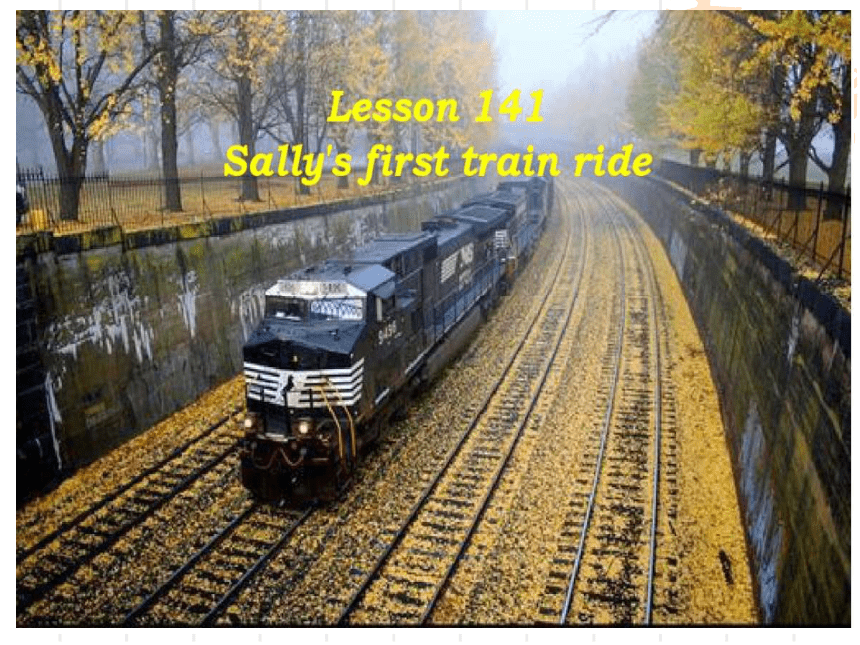 | |
| 格式 | ppt | ||
| 文件大小 | 14.4MB | ||
| 资源类型 | 教案 | ||
| 版本资源 | 新概念英语 | ||
| 科目 | 英语 | ||
| 更新时间 | 2024-03-09 18:10:11 | ||
图片预览

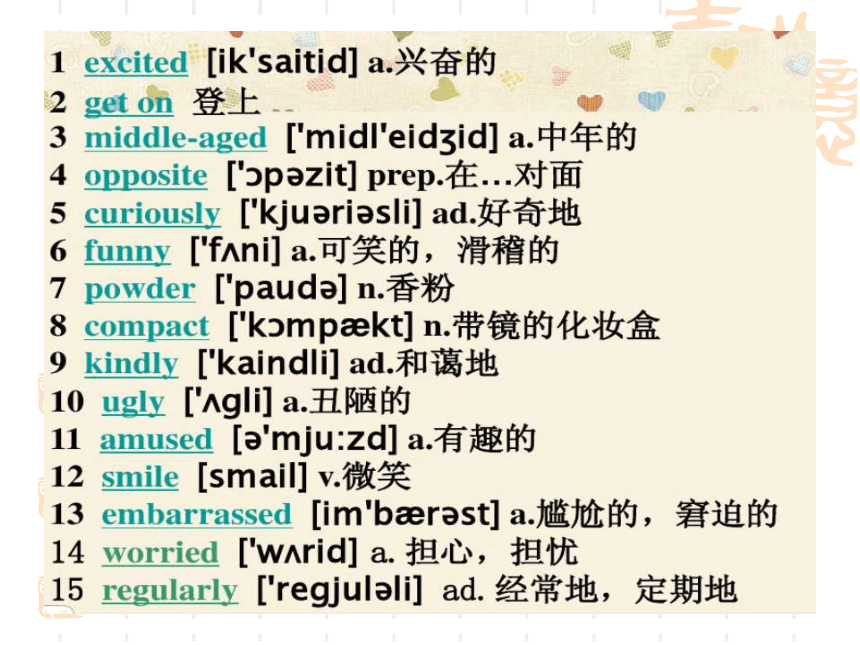
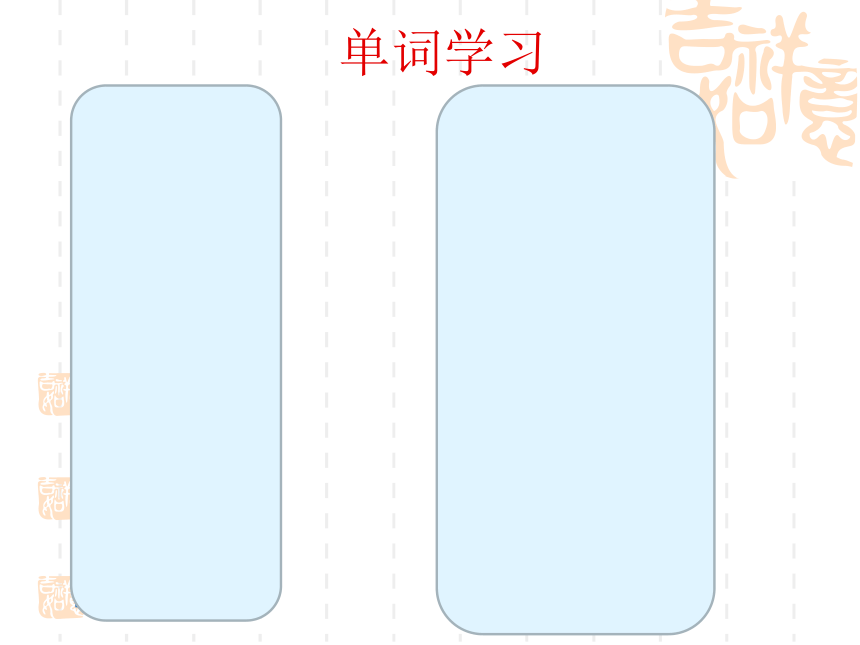
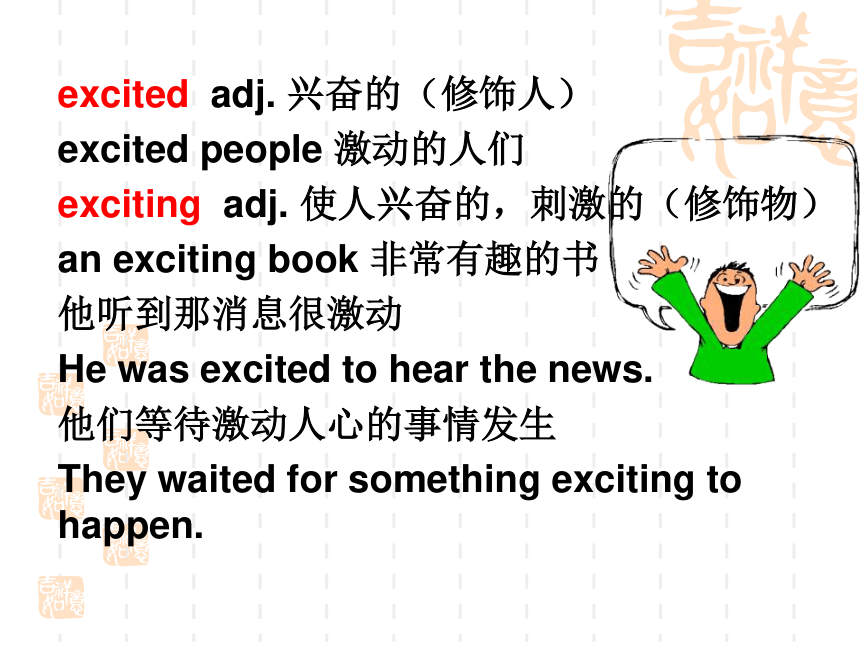
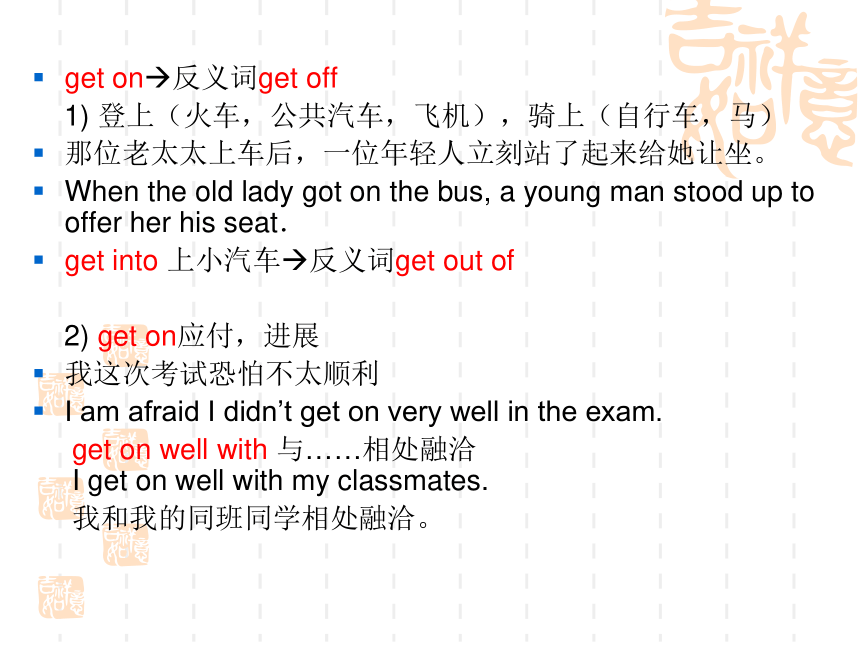
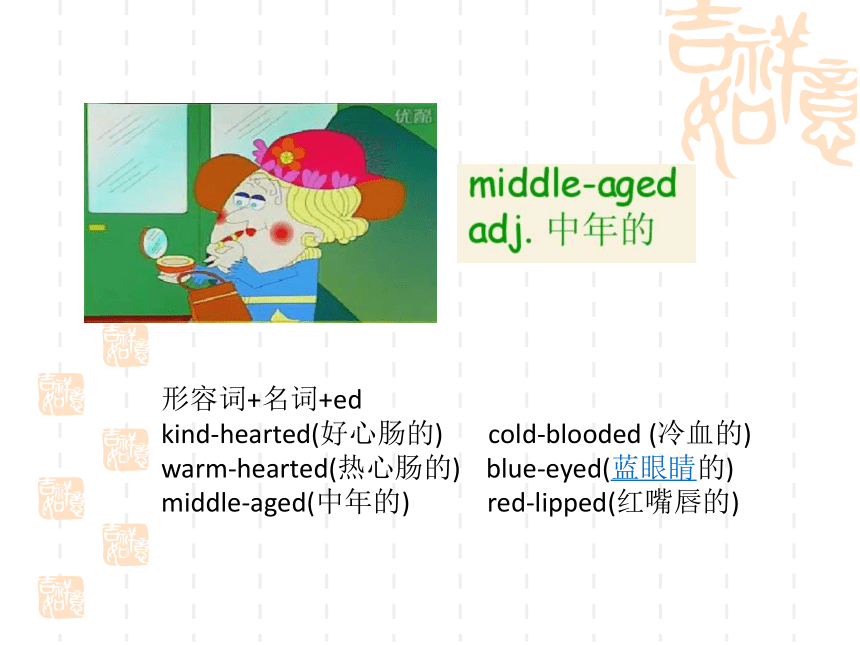
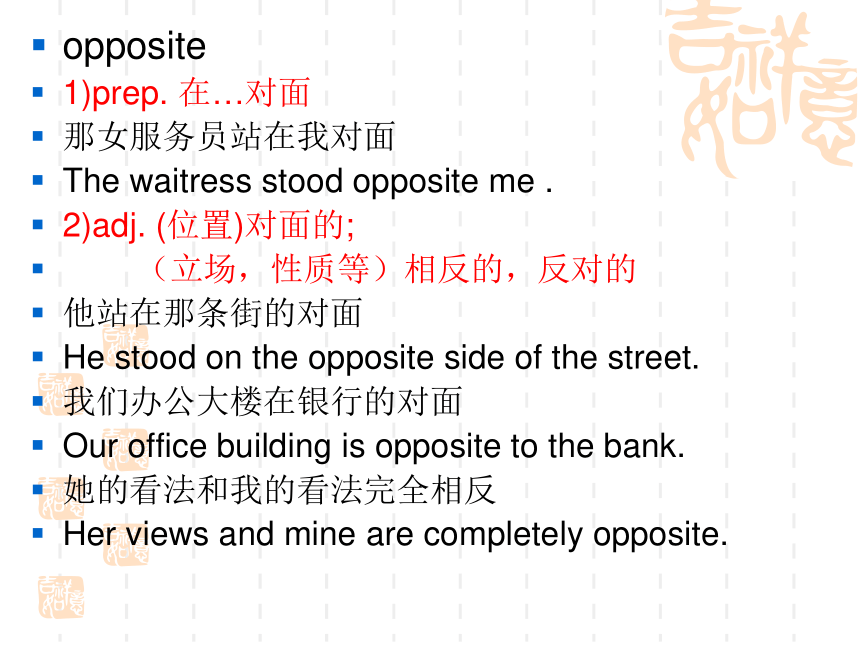
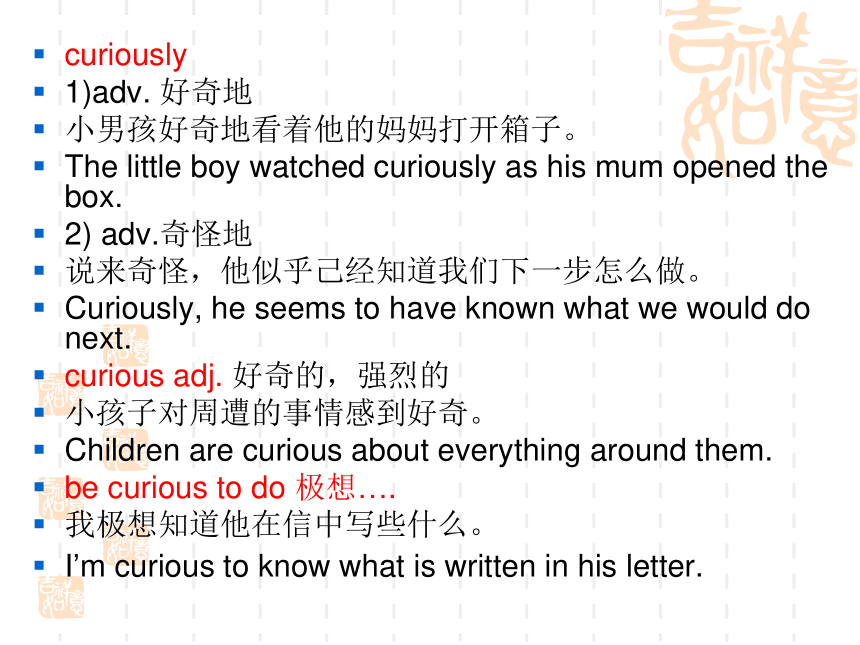
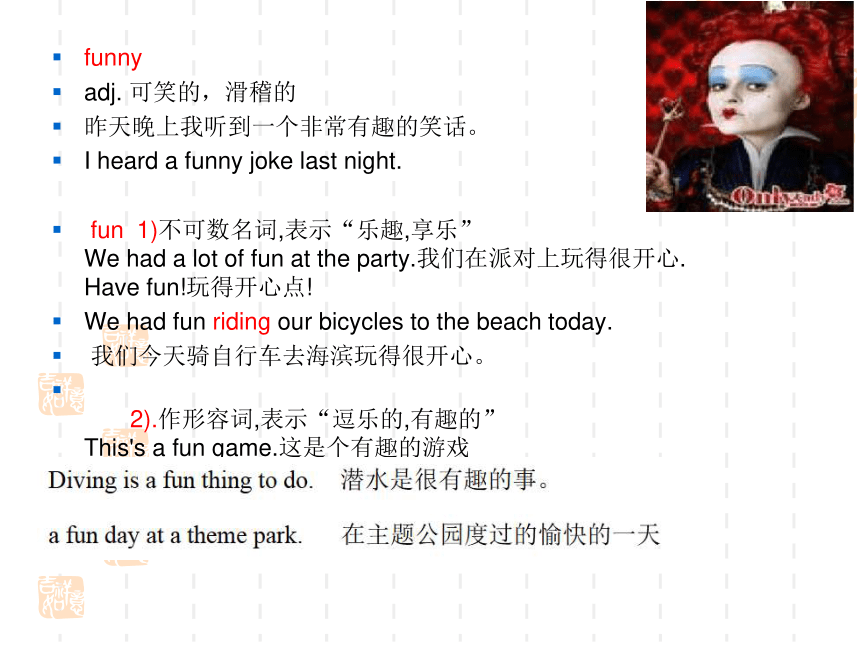
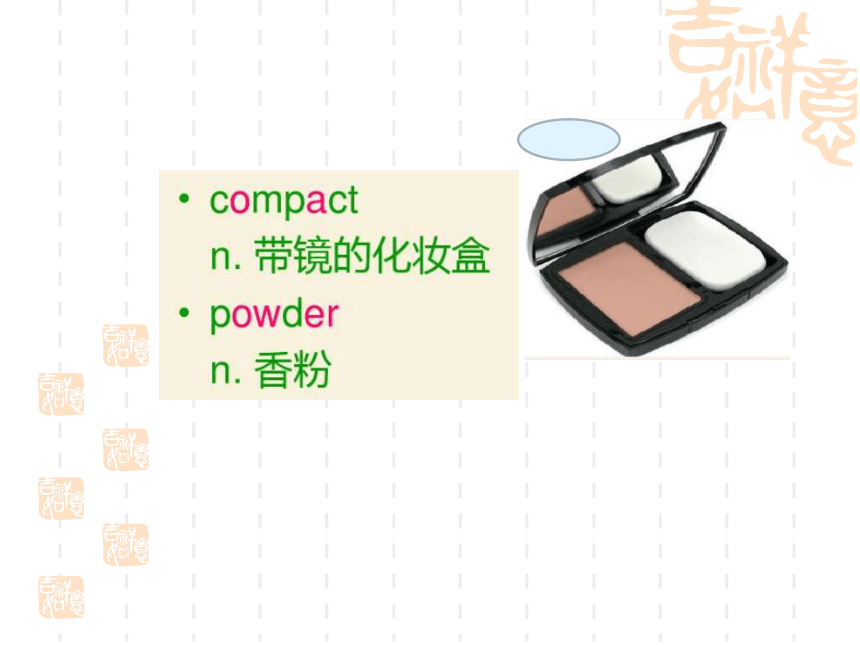
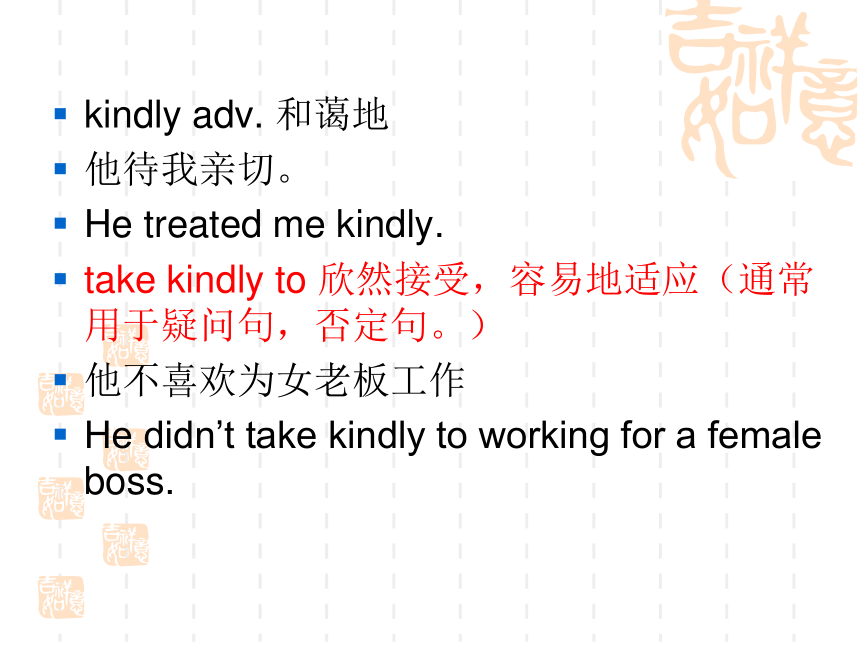
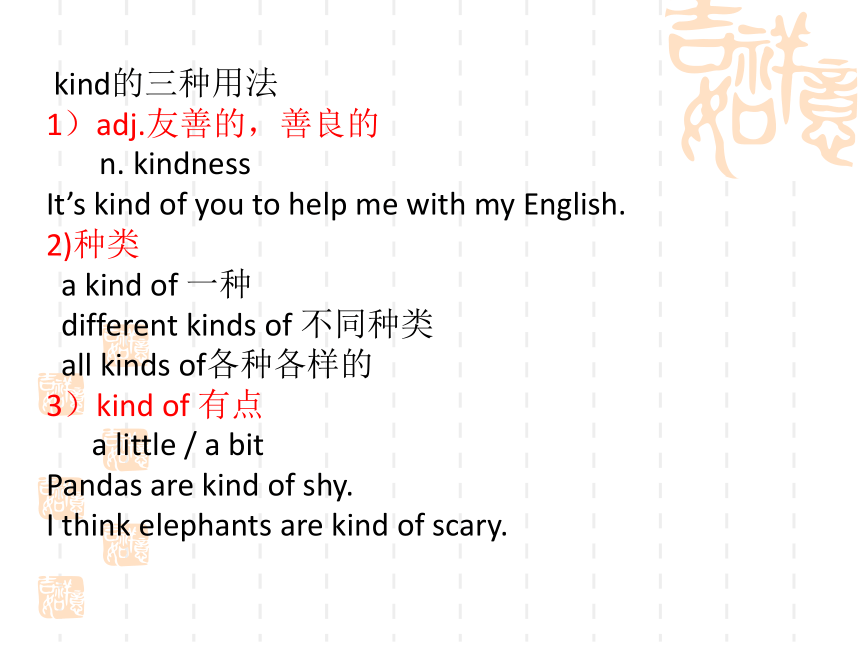
文档简介
(共66张PPT)
单词学习
excited adj. 兴奋的
get on 登上
middle-aged adj. 中年的
opposite prep.在……对面
curiously adv.好奇地
funny adj. 可笑的,滑稽的
powder n. 香粉
compact n. 带镜的化妆盒
kindly adv. 和蔼地
ugly adj. 丑陋的
amused adj. 有趣的
smile v. 微笑
embarrassed adj. 尴尬
excited adj. 兴奋的(修饰人)
excited people 激动的人们
exciting adj. 使人兴奋的,刺激的(修饰物)
an exciting book 非常有趣的书
他听到那消息很激动
He was excited to hear the news.
他们等待激动人心的事情发生
They waited for something exciting to happen.
get on 反义词get off
1) 登上(火车,公共汽车,飞机),骑上(自行车,马)
那位老太太上车后,一位年轻人立刻站了起来给她让坐。
When the old lady got on the bus, a young man stood up to offer her his seat.
get into 上小汽车 反义词get out of
2) get on应付,进展
我这次考试恐怕不太顺利
I am afraid I didn’t get on very well in the exam.
get on well with 与……相处融洽 I get on well with my classmates.
我和我的同班同学相处融洽。
形容词+名词+ed
kind-hearted(好心肠的) cold-blooded (冷血的)
warm-hearted(热心肠的) blue-eyed(蓝眼睛的)
middle-aged(中年的) red-lipped(红嘴唇的)
opposite
1)prep. 在…对面
那女服务员站在我对面
The waitress stood opposite me .
2)adj. (位置)对面的;
(立场,性质等)相反的,反对的
他站在那条街的对面
He stood on the opposite side of the street.
我们办公大楼在银行的对面
Our office building is opposite to the bank.
她的看法和我的看法完全相反
Her views and mine are completely opposite.
curiously
1)adv. 好奇地
小男孩好奇地看着他的妈妈打开箱子。
The little boy watched curiously as his mum opened the box.
2) adv.奇怪地
说来奇怪,他似乎己经知道我们下一步怎么做。
Curiously, he seems to have known what we would do next.
curious adj. 好奇的,强烈的
小孩子对周遭的事情感到好奇。
Children are curious about everything around them.
be curious to do 极想….
我极想知道他在信中写些什么。
I’m curious to know what is written in his letter.
funny
adj. 可笑的,滑稽的
昨天晚上我听到一个非常有趣的笑话。
I heard a funny joke last night.
fun 1)不可数名词,表示“乐趣,享乐” We had a lot of fun at the party.我们在派对上玩得很开心. Have fun!玩得开心点!
We had fun riding our bicycles to the beach today.
我们今天骑自行车去海滨玩得很开心。
2).作形容词,表示“逗乐的,有趣的” This's a fun game.这是个有趣的游戏
kindly adv. 和蔼地
他待我亲切。
He treated me kindly.
take kindly to 欣然接受,容易地适应(通常用于疑问句,否定句。)
他不喜欢为女老板工作
He didn’t take kindly to working for a female boss.
kind的三种用法
1)adj.友善的,善良的
n. kindness
It’s kind of you to help me with my English.
2)种类
a kind of 一种
different kinds of 不同种类
all kinds of各种各样的
3)kind of 有点
a little / a bit
Pandas are kind of shy.
I think elephants are kind of scary.
ugly adj. 丑陋的,难看的
现在他把一个丑陋的石雕头像挂在大门上。
Now he puts an ugly stone head over the gate.
amused adj. 有趣的,表示(人表情等)愉快
amusing adj. 好笑的,好玩的,有趣的
Sally was amused.
去年我有过一次好笑的经历。
I had an amusing experience last year.
amuse v. 使(某人)快乐,逗乐
This story amused me.
embarrassed adj. 尴尬的,窘迫的,觉得不好意思的
embarrassing adj. 令人尴尬的,令人困惑的
embarrass v. 使人窘迫,使人为难,使人不好意思
在那一刻,他觉得非常尴尬。
He felt so embarrassed at that moment.
我开始唱歌时,他大笑起来,使我感到很窘。
When I began to sing, he laughed and made me embarrassed.
在众人面前演说时,我觉得慌张困窘
Making speeches in public always embarrasses me.
This is an embarrassing situation.
Watch the vidio, answer these questions:
课文讲解
Last week, my four-year-old daughter, Sally, was invited to a children’s party.
four-year-old 合成形容词,其中名词必须用单数形式。
一座800米长的桥
an 800-metre-long bridge
invited sb. to… 主动语态
sb. was invited to 被邀请去,被动语态
我被邀请参加颁奖仪式。
I am invited to the award ceremony.
I decided to take her by train.
decide to do sth 决定去做某事
我决定开始学习法语。
I’ve decided to learn French.
Sally was very excited because she had never travelled on a train before.
because 连词,引导原因状语从句
我不干,因为我不喜欢。
I won’t do it, because I don’t like it.
on a train=by train
过去完成时
She sat near the window and asked questions about everything she saw.
ask questions about 对…提出问题
everything (she saw) 她所看到的一切
=everything that she saw
Last week 4 Sally a party
decide by train
excited because
sat near asked
Suddenly, a middle-aged lady got on the train and sat opposite Sally.
形容词+名词+ed,构成形容词相当于with介词短语
一个长脸的人
a long-faced man =a man with a long face
一个大眼睛的女孩
a big-eyed girl= a girl with big eyes
get on the train 上火车
“Hello, little girl,’ she said. Sally did not answer, but looked at her curiously.
The lady was dressed in a blue coat and a large, funny hat.
be dressed in (=wear, have on)穿着…
在那个年代,人人都穿蓝色或绿色的衣服。
In those years, everyone was dressed in blue or green.
dress是及物动词,意为“为...穿衣” dress sb
如:The babysitter dresses the baby everyday.
保姆每天都要给宝宝穿衣。
而be/get dressed (in)意为“穿着...”,如果后跟宾语,则in不可少。
如:She is dressed well today.她今天穿得很漂亮。
She is dressed in a new skirt.她穿着一条新裙子
suddenly lady got on sat opposite
hello did not answer looked at
was dressed in coat hat
After the train had left the station, the lady opened her handbag and took out her power compact.
take out 拿出,取出
学生们拿出课本,开始阅读。
The students took out their textbooks and started reading.
She then began to make up her face.
make up 化妆,打扮
我们赶到的时候,演员们还在化妆。
The actors were making up when we arrived.
make up编造
Some of the stories are made up
‘Why are you doing that ’ Sally asked.
doing that=making up your face
‘To make myself beautiful,’ the lady answered.
She put away her compact and smiled kindly.
put away 放在一边,收起
他收好书,起身走了。
He put his books away, stood up and left.
'But you are still ugly,' Sally said.
Sally was amused, but I was very embarrassed!
amused 高兴快乐的,开心的,有趣的
embarrassed 分词形容词,尴尬的,窘迫的
After had left
The lady opened took out
Then began to
Why Sally
To the lady answered
She put smiled
But ugly
Sally amused I embarrassed
Passive Voice 被动语态
English is spoken by the most people in the world.
spoken
English
The Great Wall was built by Chinese people.
built
The trees were planted by students.
planted
英语动词有两种语态:
主动语态 (the Active Voice)
被动语态(the Passive Voice)
What is it
A. 主动语态表示主语是动作的执行者。
B. 被动语态表示主语是动作的承受者。
We planted the tree.
The tree was planted by us.
被动语态结构:
be + 过去分词(P.P) + (by …)
are
主动语态变被动语态解题步骤:
1. 找宾语 ----即动作的承受者
They make shoes in that factory.
Shoes
2. 判断宾语的单复数 ----即be动词的单复数.
3. 判断动词的时态 ----即be动词的时态.
4. 修改谓语的时态 ----即原句动词改为过去分词
made
5. 修改原句的主语 ----即by+ 主语.
by them.
We cleaned the classroom yesterday.
The classroom
was cleaned
by us...
do did done
go went gone
see saw seen
give gave given
choose chose chosen
draw drew drawn
eat ate eaten
take took taken
speak spoke spoken
write wrote written
show showed shown
buy bought bought
catch caught caught
think thought thought
teach taught taught
build built built
keep kept kept
hear heard heard
find found found
make made made
tell told told
cut cut cut
send sent sent
一般现在时的被动语态:
am/are/is + 过去分词+(by…)
1. People play football all over the world.
2. Galaxy teaches us this term.
Football all over the world
.
We this term.
is played
by people
are taught (by Galaxy)
一般过去时的被动语态:
was/were + 过去分词+(by…)
3. People built the Great Wall long ago.
4. My classmates planted many flowers yesterday.
The Great Wall___________________
long ago.
Many flowers
______________________________yesterday.
was built (by people)
were planted (by my classmates)
情态动词的被动语态:
must/should/can等 + be + 过去分词
5. You must throw the broken glass away at once.
6. We can finish our homework on time.
The broken glass
at once.
Our homework
_____________________on time.
must be thrown away (by you)
can be finished (by us)
1.People use knives for cutting things.
Knives_____ ______ for cutting things.
2. The students in this school study German.
German _______ ________ by the students in this school.
are used
is studied
3.I found the ticket on the floor.
The ticket ______ ______ on the floor.
4.I told her to return the book in time.
She ______ _______ to return the book in time.
was found
was told
5.He can mend the bike in two days.
The bike ______ ______ _______ in two days.
6.You must take this medicine three times a day.
This medicine _______ ___ ________ three times a day.
can be mended
must be
taken
1. A neighbor helped to keep our dog. It __________while we were on holiday. (2005)
A. was taken care B. took care of
C. is taken care of D. was taken care of
2. Watches____ Shanghai are good .
A. are made in B. is made
C. are made from D. made in
考试考什么
D
D
3. A coat can_____ for keeping warm.
A. be used B. is used
C. been used D. used
4. The book ________ as a present yesterday.
A. was given to him
B. was given for him C. was give him
A
A
5.People there planted many trees last year.
Trees _______ ________ by people there last year.(同义句转换)
(青岛市中考题)
6. They grow vegetables on the farm. (上海市中考题)
The vegetables ______ _________on the farm.
T
were planted
are grown
用适当的形式填空
1. History is _________ by the people. ( make)
2. He is often ___________ to do the work by the teacher. (ask)
3. The book ___________ by him last year. ( write )
4. The radio ______________ last week. ( mend)
made
asked
was written
was mended
用所给动词的正确形式填空:
1). The bike __________(fix) up by Xiao
Ming yesterday.
2). Sunglasses __________ (use) for
protecting people’s eyes.
3). A picture _________(put) up on the
blackboard.
4). French___________ (speak) in France.
5). Teenagers should _________(allow) to
choose their own clothes.
was fixed
are used
is put
is spoken
be allowed
5)Exercises:
选择填空:
Windows_____ of glass.
be made B. is made C. are made D. been made
2. The house_____ in 2004.
is built B. is building C. was built D. used
3. A coat can_____ for keeping warm.
be used B. is used C. been used D. used
C
C
A
4. Watches____ Shanghai last year.
A. are made in B. is made
C. are made from D. made
5. This desk is made _____ wood.
A. of B. from C. in D. by
A
A
6.Now people can use computers to help them.
Now computers _______ ______ ______ to help them.
can be used
7.The teacher asked Tom to turn on the computer.
Tom _______ ________ to turn on the computer.
8.In this factory women do most of the work.
Most of the work _______ ________ by women in this factory.
was asked
is done
一般现在时: am / is / are +done
一般过去时: was / were+ done
当句中含有情态动词时,句子结构为 can / must / +be done
The bike is made in our factory. 这自行车是我们厂生产的。
This book was written in 1969. 这本书是1969年写成的。
The baby must be looked after well. 这孩子必须被好好照顾。
1.Rice in the south of china.
A grows B is grown C are grown D grew
2.English by us every morning.
A is B reads C are read D is read
3. A car in1885.
A were invented B was invented
C is invented D invented
4.The shop last night.
A is robbed B was robbed C are robbed D opened
5.The work must in two weeks.
A be finish B be finished C finish D will finis
B
D
B
B
B
5.The work must in two weeks.
A be finish B be finished
C finish D will finish
6. Those things may to the room.
A move B moved
C be moved D are moved
7.Where the cars
A are……made B do……make
C were ……made D is …..made
8.The train station in 1981.
A is built B are built
C was built D were built
B
C
C
C
Thank you!
单词学习
excited adj. 兴奋的
get on 登上
middle-aged adj. 中年的
opposite prep.在……对面
curiously adv.好奇地
funny adj. 可笑的,滑稽的
powder n. 香粉
compact n. 带镜的化妆盒
kindly adv. 和蔼地
ugly adj. 丑陋的
amused adj. 有趣的
smile v. 微笑
embarrassed adj. 尴尬
excited adj. 兴奋的(修饰人)
excited people 激动的人们
exciting adj. 使人兴奋的,刺激的(修饰物)
an exciting book 非常有趣的书
他听到那消息很激动
He was excited to hear the news.
他们等待激动人心的事情发生
They waited for something exciting to happen.
get on 反义词get off
1) 登上(火车,公共汽车,飞机),骑上(自行车,马)
那位老太太上车后,一位年轻人立刻站了起来给她让坐。
When the old lady got on the bus, a young man stood up to offer her his seat.
get into 上小汽车 反义词get out of
2) get on应付,进展
我这次考试恐怕不太顺利
I am afraid I didn’t get on very well in the exam.
get on well with 与……相处融洽 I get on well with my classmates.
我和我的同班同学相处融洽。
形容词+名词+ed
kind-hearted(好心肠的) cold-blooded (冷血的)
warm-hearted(热心肠的) blue-eyed(蓝眼睛的)
middle-aged(中年的) red-lipped(红嘴唇的)
opposite
1)prep. 在…对面
那女服务员站在我对面
The waitress stood opposite me .
2)adj. (位置)对面的;
(立场,性质等)相反的,反对的
他站在那条街的对面
He stood on the opposite side of the street.
我们办公大楼在银行的对面
Our office building is opposite to the bank.
她的看法和我的看法完全相反
Her views and mine are completely opposite.
curiously
1)adv. 好奇地
小男孩好奇地看着他的妈妈打开箱子。
The little boy watched curiously as his mum opened the box.
2) adv.奇怪地
说来奇怪,他似乎己经知道我们下一步怎么做。
Curiously, he seems to have known what we would do next.
curious adj. 好奇的,强烈的
小孩子对周遭的事情感到好奇。
Children are curious about everything around them.
be curious to do 极想….
我极想知道他在信中写些什么。
I’m curious to know what is written in his letter.
funny
adj. 可笑的,滑稽的
昨天晚上我听到一个非常有趣的笑话。
I heard a funny joke last night.
fun 1)不可数名词,表示“乐趣,享乐” We had a lot of fun at the party.我们在派对上玩得很开心. Have fun!玩得开心点!
We had fun riding our bicycles to the beach today.
我们今天骑自行车去海滨玩得很开心。
2).作形容词,表示“逗乐的,有趣的” This's a fun game.这是个有趣的游戏
kindly adv. 和蔼地
他待我亲切。
He treated me kindly.
take kindly to 欣然接受,容易地适应(通常用于疑问句,否定句。)
他不喜欢为女老板工作
He didn’t take kindly to working for a female boss.
kind的三种用法
1)adj.友善的,善良的
n. kindness
It’s kind of you to help me with my English.
2)种类
a kind of 一种
different kinds of 不同种类
all kinds of各种各样的
3)kind of 有点
a little / a bit
Pandas are kind of shy.
I think elephants are kind of scary.
ugly adj. 丑陋的,难看的
现在他把一个丑陋的石雕头像挂在大门上。
Now he puts an ugly stone head over the gate.
amused adj. 有趣的,表示(人表情等)愉快
amusing adj. 好笑的,好玩的,有趣的
Sally was amused.
去年我有过一次好笑的经历。
I had an amusing experience last year.
amuse v. 使(某人)快乐,逗乐
This story amused me.
embarrassed adj. 尴尬的,窘迫的,觉得不好意思的
embarrassing adj. 令人尴尬的,令人困惑的
embarrass v. 使人窘迫,使人为难,使人不好意思
在那一刻,他觉得非常尴尬。
He felt so embarrassed at that moment.
我开始唱歌时,他大笑起来,使我感到很窘。
When I began to sing, he laughed and made me embarrassed.
在众人面前演说时,我觉得慌张困窘
Making speeches in public always embarrasses me.
This is an embarrassing situation.
Watch the vidio, answer these questions:
课文讲解
Last week, my four-year-old daughter, Sally, was invited to a children’s party.
four-year-old 合成形容词,其中名词必须用单数形式。
一座800米长的桥
an 800-metre-long bridge
invited sb. to… 主动语态
sb. was invited to 被邀请去,被动语态
我被邀请参加颁奖仪式。
I am invited to the award ceremony.
I decided to take her by train.
decide to do sth 决定去做某事
我决定开始学习法语。
I’ve decided to learn French.
Sally was very excited because she had never travelled on a train before.
because 连词,引导原因状语从句
我不干,因为我不喜欢。
I won’t do it, because I don’t like it.
on a train=by train
过去完成时
She sat near the window and asked questions about everything she saw.
ask questions about 对…提出问题
everything (she saw) 她所看到的一切
=everything that she saw
Last week 4 Sally a party
decide by train
excited because
sat near asked
Suddenly, a middle-aged lady got on the train and sat opposite Sally.
形容词+名词+ed,构成形容词相当于with介词短语
一个长脸的人
a long-faced man =a man with a long face
一个大眼睛的女孩
a big-eyed girl= a girl with big eyes
get on the train 上火车
“Hello, little girl,’ she said. Sally did not answer, but looked at her curiously.
The lady was dressed in a blue coat and a large, funny hat.
be dressed in (=wear, have on)穿着…
在那个年代,人人都穿蓝色或绿色的衣服。
In those years, everyone was dressed in blue or green.
dress是及物动词,意为“为...穿衣” dress sb
如:The babysitter dresses the baby everyday.
保姆每天都要给宝宝穿衣。
而be/get dressed (in)意为“穿着...”,如果后跟宾语,则in不可少。
如:She is dressed well today.她今天穿得很漂亮。
She is dressed in a new skirt.她穿着一条新裙子
suddenly lady got on sat opposite
hello did not answer looked at
was dressed in coat hat
After the train had left the station, the lady opened her handbag and took out her power compact.
take out 拿出,取出
学生们拿出课本,开始阅读。
The students took out their textbooks and started reading.
She then began to make up her face.
make up 化妆,打扮
我们赶到的时候,演员们还在化妆。
The actors were making up when we arrived.
make up编造
Some of the stories are made up
‘Why are you doing that ’ Sally asked.
doing that=making up your face
‘To make myself beautiful,’ the lady answered.
She put away her compact and smiled kindly.
put away 放在一边,收起
他收好书,起身走了。
He put his books away, stood up and left.
'But you are still ugly,' Sally said.
Sally was amused, but I was very embarrassed!
amused 高兴快乐的,开心的,有趣的
embarrassed 分词形容词,尴尬的,窘迫的
After had left
The lady opened took out
Then began to
Why Sally
To the lady answered
She put smiled
But ugly
Sally amused I embarrassed
Passive Voice 被动语态
English is spoken by the most people in the world.
spoken
English
The Great Wall was built by Chinese people.
built
The trees were planted by students.
planted
英语动词有两种语态:
主动语态 (the Active Voice)
被动语态(the Passive Voice)
What is it
A. 主动语态表示主语是动作的执行者。
B. 被动语态表示主语是动作的承受者。
We planted the tree.
The tree was planted by us.
被动语态结构:
be + 过去分词(P.P) + (by …)
are
主动语态变被动语态解题步骤:
1. 找宾语 ----即动作的承受者
They make shoes in that factory.
Shoes
2. 判断宾语的单复数 ----即be动词的单复数.
3. 判断动词的时态 ----即be动词的时态.
4. 修改谓语的时态 ----即原句动词改为过去分词
made
5. 修改原句的主语 ----即by+ 主语.
by them.
We cleaned the classroom yesterday.
The classroom
was cleaned
by us...
do did done
go went gone
see saw seen
give gave given
choose chose chosen
draw drew drawn
eat ate eaten
take took taken
speak spoke spoken
write wrote written
show showed shown
buy bought bought
catch caught caught
think thought thought
teach taught taught
build built built
keep kept kept
hear heard heard
find found found
make made made
tell told told
cut cut cut
send sent sent
一般现在时的被动语态:
am/are/is + 过去分词+(by…)
1. People play football all over the world.
2. Galaxy teaches us this term.
Football all over the world
.
We this term.
is played
by people
are taught (by Galaxy)
一般过去时的被动语态:
was/were + 过去分词+(by…)
3. People built the Great Wall long ago.
4. My classmates planted many flowers yesterday.
The Great Wall___________________
long ago.
Many flowers
______________________________yesterday.
was built (by people)
were planted (by my classmates)
情态动词的被动语态:
must/should/can等 + be + 过去分词
5. You must throw the broken glass away at once.
6. We can finish our homework on time.
The broken glass
at once.
Our homework
_____________________on time.
must be thrown away (by you)
can be finished (by us)
1.People use knives for cutting things.
Knives_____ ______ for cutting things.
2. The students in this school study German.
German _______ ________ by the students in this school.
are used
is studied
3.I found the ticket on the floor.
The ticket ______ ______ on the floor.
4.I told her to return the book in time.
She ______ _______ to return the book in time.
was found
was told
5.He can mend the bike in two days.
The bike ______ ______ _______ in two days.
6.You must take this medicine three times a day.
This medicine _______ ___ ________ three times a day.
can be mended
must be
taken
1. A neighbor helped to keep our dog. It __________while we were on holiday. (2005)
A. was taken care B. took care of
C. is taken care of D. was taken care of
2. Watches____ Shanghai are good .
A. are made in B. is made
C. are made from D. made in
考试考什么
D
D
3. A coat can_____ for keeping warm.
A. be used B. is used
C. been used D. used
4. The book ________ as a present yesterday.
A. was given to him
B. was given for him C. was give him
A
A
5.People there planted many trees last year.
Trees _______ ________ by people there last year.(同义句转换)
(青岛市中考题)
6. They grow vegetables on the farm. (上海市中考题)
The vegetables ______ _________on the farm.
T
were planted
are grown
用适当的形式填空
1. History is _________ by the people. ( make)
2. He is often ___________ to do the work by the teacher. (ask)
3. The book ___________ by him last year. ( write )
4. The radio ______________ last week. ( mend)
made
asked
was written
was mended
用所给动词的正确形式填空:
1). The bike __________(fix) up by Xiao
Ming yesterday.
2). Sunglasses __________ (use) for
protecting people’s eyes.
3). A picture _________(put) up on the
blackboard.
4). French___________ (speak) in France.
5). Teenagers should _________(allow) to
choose their own clothes.
was fixed
are used
is put
is spoken
be allowed
5)Exercises:
选择填空:
Windows_____ of glass.
be made B. is made C. are made D. been made
2. The house_____ in 2004.
is built B. is building C. was built D. used
3. A coat can_____ for keeping warm.
be used B. is used C. been used D. used
C
C
A
4. Watches____ Shanghai last year.
A. are made in B. is made
C. are made from D. made
5. This desk is made _____ wood.
A. of B. from C. in D. by
A
A
6.Now people can use computers to help them.
Now computers _______ ______ ______ to help them.
can be used
7.The teacher asked Tom to turn on the computer.
Tom _______ ________ to turn on the computer.
8.In this factory women do most of the work.
Most of the work _______ ________ by women in this factory.
was asked
is done
一般现在时: am / is / are +done
一般过去时: was / were+ done
当句中含有情态动词时,句子结构为 can / must / +be done
The bike is made in our factory. 这自行车是我们厂生产的。
This book was written in 1969. 这本书是1969年写成的。
The baby must be looked after well. 这孩子必须被好好照顾。
1.Rice in the south of china.
A grows B is grown C are grown D grew
2.English by us every morning.
A is B reads C are read D is read
3. A car in1885.
A were invented B was invented
C is invented D invented
4.The shop last night.
A is robbed B was robbed C are robbed D opened
5.The work must in two weeks.
A be finish B be finished C finish D will finis
B
D
B
B
B
5.The work must in two weeks.
A be finish B be finished
C finish D will finish
6. Those things may to the room.
A move B moved
C be moved D are moved
7.Where the cars
A are……made B do……make
C were ……made D is …..made
8.The train station in 1981.
A is built B are built
C was built D were built
B
C
C
C
Thank you!
同课章节目录
